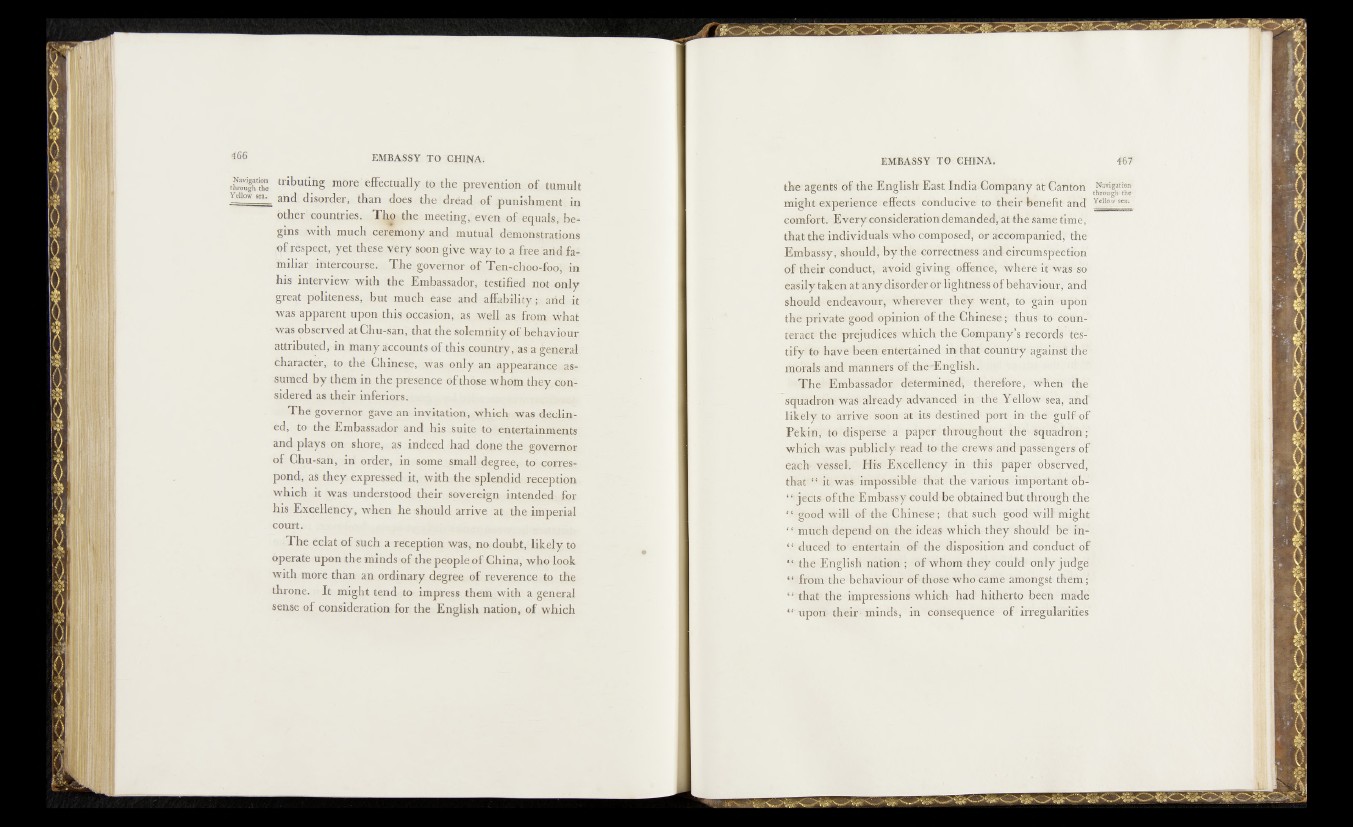
& j f i S tributihg effectually -t^Ahe prevention M tumult
- upw *"' and; disorder, than does. tho j drtfad of .punishment. in
other' countries. Tho||he meeting,; even of-equals,- be*
gins with much ceillnony and mutual demonstrations
tff respect, yet these very soon give way to a free arid familiar
intercourse. The goveinor of Ten-choo-fool in
his interview with the Embassador, t e s t i f i edonl y
great politeness, but much Case and affability;; arid it
was apparent upon this occasion, as well as from what
was observed «fcdhmsan, that the sQlemriity of behaviour
attributed, in many accounts of this.country, as a |emeral
character,: to; thrf Chinese^ was only an appearance as*
swmed by them in the presence of those whom fchny Considered
as their inferiors.
The governor, gave an invitation, Whieh* was ddeliii-
ed, to the Embassador and liis suite to entertainments
and plays on shore,- as indeed hadjdiffothig governor
of Chu-san, in order, in some small degree, toc-eorresj
pond, as they expressed it, whh the splendid-seeepteon
which it was understood their sovereign intendeds for
his Excellency, when he-should arrive at die imperial
court.
The eclat of such a reception was* no. doubt, likelpfo
operate upon the minds of the people of jShioa, who look
with more than an ordinary degree of reverence to the
throne. It might tend- to impress them with a general
sense of eonsidesration for the English nation* of which
the agents of the English East, India* Gentpany A#©awtori
might experience effects conducive to-their benefit aitd
comfort. Every consideration demandedy at thesame tirade/
that the individuals who composted^- ör-foeotepanied,- ’the
Embassy, should, by tbe~<£©Trfeetfless.ahdbé’ir£ïïms<peefferi
of their- conduces aVcnékgiving- offefffc^ wheréit' w^solf
easily taken atAny disorder orfighMèsS of feeh»^$d¥ya:hdf
shouldv endeavour, wherever they Went,- uê ^hi-upon
the? private-good opinion ofith^(lbïiÉesö^thu#fo£êbün-
foraë# the^-prepudicesfwhisch the- 6©mpany’s.trb€öreW
tify-to haveifbéénl entertained in that Gentry agMiM l?h©|
morals» and- manners of thedfegM^h ,± £
ThefoEmfeassador determined, therefore, ‘when- the
scfuadroiV'W'as' already advanced'^ifl -the Yel-ioW-^ëa,-" and’
likely to- arrive • soon at * its-destined5' port in mgfgulf-of
P'ekirt,' te ?dispérse - a»"<pö p ey~ tfowgftout• thé'-* ^tfatfrön;
which was* publicly read -to'-the öré#»v and^Éilln|'ê¥^bf
each* Vhssek His Excellency -in- this pajifeV observed,'
that-1 ?'ftï was; impossible that dié various.-'M^lèrÉant ’Sb-"’
‘*■ jéttó'éifithe Embassyeoüld-bëfobtaiiiedfelit'tnrbli^h^die
I * go#d will; of-'the- GhiiidSe; that silSfe goodwill might
“ mueh»dép'éndr©n the ideas which-they should be- in-
‘ | ducedl to- enfeiftaift o f the'- disposition and kóriduët-or
‘fcthö'English nation»; of5 whom they could- oMyjfiWgéf,'
‘‘■from the behaviour of those- who c'aöié amongst* them
“ that-the impressions-which- had* hitherto been rft$de
upon- their| minds, in irregulitMes